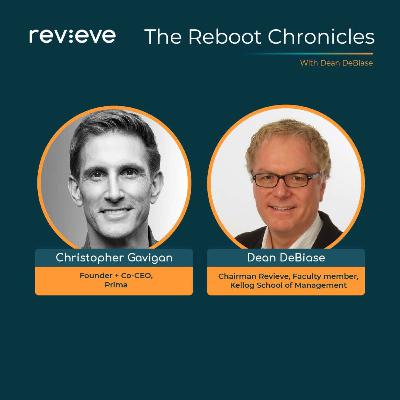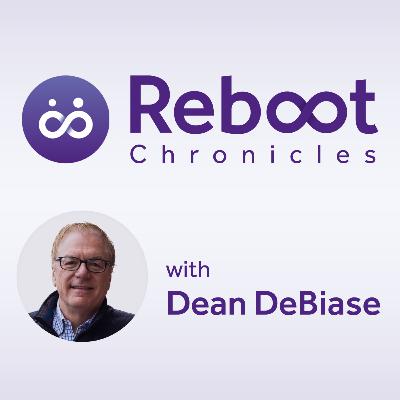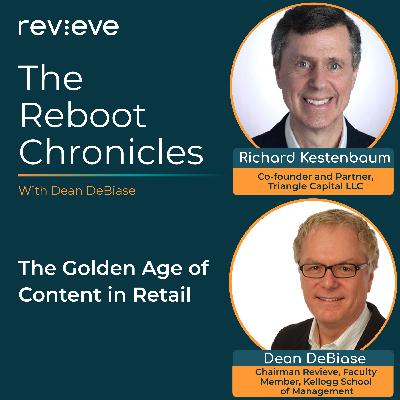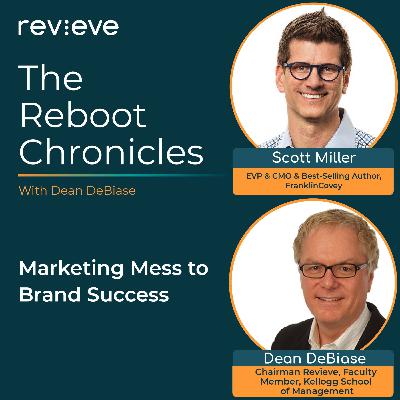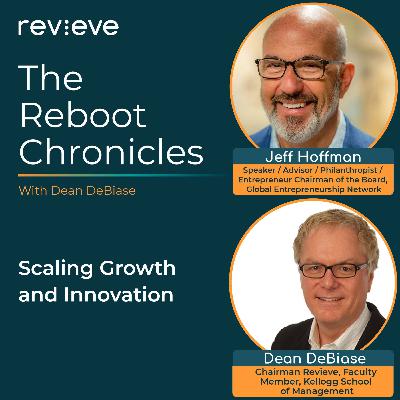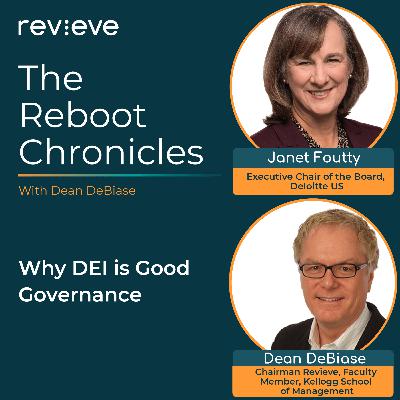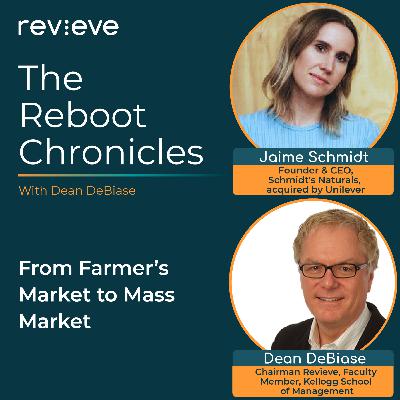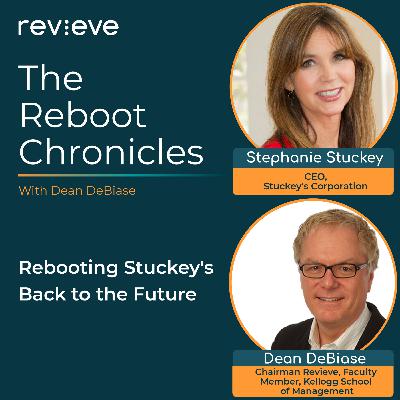Discover The Reboot Chronicles with Dean DeBiase
The Reboot Chronicles with Dean DeBiase

The Reboot Chronicles with Dean DeBiase
Author: Dean DeBiase
Subscribed: 9Played: 85Subscribe
Share
© Dean DeBiase
Description
The Reboot Chronicles Show with Dean DeBiase, highlights the world’s top leaders & CEO’s through engaging peer-to-peer conversations that audiences love, available wherever you get podcasts, with thousands of listeners, watchers, readers, and fans. - -
About Host: Named “Growth Guru” by Inc., Dean DeBiase is a WSJ best-selling author, Forbes Contributor, speaker, Kellogg/Northwestern faculty member—and award-winning serial CEO who has led dozens of companies across diverse sectors, creating hundreds of products, thousands of jobs, and billions of dollars in revenue, capital, and value.
About Host: Named “Growth Guru” by Inc., Dean DeBiase is a WSJ best-selling author, Forbes Contributor, speaker, Kellogg/Northwestern faculty member—and award-winning serial CEO who has led dozens of companies across diverse sectors, creating hundreds of products, thousands of jobs, and billions of dollars in revenue, capital, and value.
206 Episodes
Reverse
I recently sat down with Christopher Gavigan, the founder of Honest Company, (which had a wildly successful IPO this year) to talk about Prima, his latest venture. With this company he is boldly going into the premium CBD space, separating the “woo woo” from science, and in the process bringing pain and sleep relief to a Covid weary world.
Chris started thinking about CBD products before he teamed up with Jessica Alba to launch the Honest Company in 2012. His latest venture went on hold as he built one of the most successful subscription-based CPGs of recent times. He’s someone who understood the potential for purpose driven, natural, healthy, clean nontoxic lifestyle goods. He’s also a champion of human health social entrepreneurship, and author of a bestselling book I like called Healthy Child, Healthy World: Creating a Cleaner, Greener, Safer Home.
Heart to Beat: What A Cardiac Surgeon’s Experience Says About Leadership
Dr. Brian Lima
At the Reboot Chronicles, we most often talk to business executives about their challenges and triumphs. I met Dr. Brian Lima speaking at a conference and decided to up our ante to life or death issues. Dr. Brian Lima is a cardiothoracic surgeon and bestselling author of an inspirational autobiography, Heart to Beat, was awarded the 2020 top doctor of the year. I spoke with him about how his work and life embody the principles of the Reboot Chronicles: be nimble, adapt to what life throws at you and always be leading.
Dr. Lima is a global authority on advanced heart failure, heart transplants and medical circulatory devices. In his world, there is no room for failure. How does he keep the stress in check? How did he rise to this position?
When I met Dr. Lima, I was struck by his childhood story about how he came to want to be a doctor. Lots of people would probably mention a character they saw on TV as an inspiration. For Dr. Lima, it was at the age of 10 seeing his father have a heart attack. He turned the fear and helplessness into a desire to become a doctor. When he got to a surgery rotation in his training he found his “do what you love” moment. As he says: “Surgery was love at first sight. And it was just a natural fit. It just seemed to click. I couldn't think of myself doing anything else.”
And while surgeons are renowned for their confidence and egos, Dr. Lima is rather modest about his abilities. He’d agree with the old “99% perspiration” adage. Surprisingly, he never felt like heI was the smartest kid in class. “I felt like I always had probably a lower IQ relative to what I would you know, what I thought of as really geniuses with photographic memories.” What was his solution? He worked two or three times as hard and excelled even though it took him longer periods of time to absorb the information. He felt like an underdog but that was part of his motivation.
Andrea Harrison, VP of Beauty & Personal Care at CVS Pharmacy, is a business executive for whom the pandemic brought radical growth opportunity. She oversees beauty at 10,000 CVS locations that are within 10 miles of 80% of the US population. CVS Health has been growing rapidly over the last few years and forecasted to deliver over $300 billion of revenue in 2022. When so many retailers were shut, Andrea and her remarkable team had “the perfect sandbox” to explore how to connect with customers both #IRL and online and engage them in product trial. As Andrea sees it, we are in the midst of a whole personal exploration into the nature of “self-care” and CVS was able to meet the expanding needs of its customers whether it was a drive through rapid test, something I did a few times, administering crucial vaccines or simply testing a new type of mascara or bath salt.
Rami Rahim, CEO of Juniper Networks is someone who truly can be labeled a pioneer in the building of the Internet. Headquartered in Silicon Valley with over 9000 employees, operations in 50 countries and over $4.7 billion in revenue, Juniper Networks played a pivotal role in how we all communicate today. Along his two-plus decades of experience at Juniper (how rare in an industry so lacking in company loyalty), Rami has received many accolades including being named by The Economic Times as one of the “most loved CEOs.” Juniper is one of the behind the scenes sort of companies that doesn’t get the attention of the media the way others do and I was delighted to pick Rami’s brain about the future of networking.
With telecom and infrastructure growth having slowed due to supply issues along with competition from cloud services, we discussed how the company is rebooting into more agile growth and moving from this hardware centric world into software, AI-driven cloud services, security and 5G.
As Rami says “Juniper has always been a true innovator in IP networking technology. We were builders of the infrastructure that helped the internet scale at a time when service providers were really struggling to keep up because it was at the cusp of the.dot-com boom. Imagine a little upstart company trying to convince service providers to trust their networks with a startup’s technology. The only reason I think we managed to get that kind of trust was because they really had no choice. Traffic was exploding. They needed technology that could keep up with it. We had an innovative new architecture and were developing routers with silicon technology. We offered a very scalable internet, and a great operating system to keep up with that demand.”
Rami went on to discuss how Juniper has rebooted itself for the cloud-based world.. “But we have evolved our business and diversified it. Now it’s very nicely split between telecom operators, which remain extremely important to us, cloud providers, (all of the major hyperscale cloud providers in the world are our customers), and global 1000 type enterprises that are increasingly trusting their networks, on our technology.In the early days, our claim to fame, our credibility, our pedigree was scale and performance. But things have evolved beyond that into experience. Right now, if I talk to a CTO, CIO or CEO of a big fortune 500 company or a telco or a cloud provider, their biggest challenge is complexity in network operations that is slowing them down. The solution to that is software driven innovation, AI-driven innovation that will remove the complexity from running networks. And yes, it will remove the human factor from running networks altogether.”
I’m a big believer that some of the best business ideas are simple, and also driven by personal conviction. I recently sat down with Kara Goldin, author of a great book called Undaunted, Overcoming Doubts and Doubters, which details how she faced up to endless naysayers and triumph with Hint Water which she scaled into a couple hundred million dollar company. What is Hint? Water with fruit essence. No sugar, no artificial flavors or sweeteners. It was one of the big successes of the Covid beverages-by-mail era. Like me, she was a Diet Coke addict who wanted to be healthier and looked at what was right in front of her: a big cup of water that she made more palatable by adding fruit slices, and she created a product out of it. This was not her first go round in startup land, she had worked at a dot com that was sold to AOL, but the first time she ever entered the consumer products space and wow, she did with a bang, or kiwi, strawberry or coconut.
David Dow, CEO, Sportsmap Tech Acquisition Corp, Gow Media
Know what a SPAC is? If you are interested in novel ways to raise money for a company, you certainly should. I recently interviewed David Gow, CEO of Gow Media, the largest media company in Texas with properties like SportMap Radio Network, 2 ESPN local stations, a lifestyle site, an automotive and a sports site. He recently created a blank check company through a SPAC (Special Purpose Acquisition Corp) IPO with the NASDAQ raising $100 million. SPACs have been all the rage over the last 24 months, with over 850 of them taken public. Is this just another risky way to find funding or a sound plan going forward?
First off, how exactly does a SPAC work? As David recounts, it’s the opposite of the typical money raising process which involves an operating entity, a business it grows up, and becomes large enough to then go public, or list on an exchange like the NASDAQ and raise a lot of capital through an IPO. “In the SPAC world, it's backward. We’ve created a hollow company listed with NASDAQ that can raise a lot of capital. But now we've got to go find the operating business. And that's why it's often referred to as ‘a blank check company.’ We've been given over $100 million to go identify and acquire or merge with a great operating business. Our special purpose is sports tech.”
With so much private equity currently available, why would you go this route? As David sees it, the opportunity brings together capital, a board which has great expertise and that public stock. “For some businesses, having a public stock creates a great currency for additional acquisitions. So we are a time and cost efficient way for a private entity to get to the public realm.” He has a point there. The planes, trains and automobiles of the roadshow process and all the filings required for an IPO are not for the faint of heart or wallet.
So what is his SPAC looking for (contact me if you want in!) are companies where technology is innovating the sports industry: eSports; health and wellness including wearable devices and businesses like Peloton which are both software and hardware; fan engagement including smart stadium technologies and fantasy and gambling.
David is particularly bullish on esports because the business models are still being defined and he and Gow Media can play an active role in that. As college athletes become able to monetize their name, image and likeness, he plans to build a platform to connect athletes with brands. NFTs also hold huge promise when connected to athletes.
One thing that David believes is a big part of fueling innovation in start-ups in his region is The Cannon, which provides support infrastructure and colocation of support resources. The Cannon offers “an angel network of investors, a mentor network, shared services of fractional CMOs and CFOs to help businesses who couldn't afford a full time employee community building programmes when somebody gets a big VC round.” Having participated in a similar project in Chicago, 1871, I can attest to how essential this sort of support is.
One of the most important topics I teach at the Kellogg School is corporate governance. Coming out of the pandemic and with heightened awareness of the impact of corporations on the future of the planet, I welcomed onto The Reboot Chronicles Ravi Chaudhry. His book, Quest for Exceptional Leadership: Mirage to Reality has been acclaimed as a discerning analysis of the leadership vacuum that pervades the world. He believes that leaders have to re-discover the leadership traits that lie dormant within them. He is the founder and Chairman of CeNext Consulting & Investment Pvt Ltd, New Delhi. Prior to that, he was Chairman of four companies in the Tata Group, India. He has consulted with many Fortune 1000 corporations as well as been an advisor to Governments of Switzerland, Turkey, Brazil and Norway, as well as the World Bank.
In Ravi’s mind, the last two years have been a breaking point for the general public with corporations. As he says, “Business leaders are pretty good at keeping track of the company's performance indices. But somehow, they still apply the toolkit of yesterday. They tend to miss out how radically society has changed in the last two years and how the social contract, which kept the wheels of economy moving, is broken.”
He sees how employees have awakened to the lack of equity, fairness, and transparency, and how an increasing proportion of customers are asking tough questions about company ethics. He typically begins his consulting with corporate leaders by asking them if they are aware that the world is changing faster than anyone could comprehend, in directions that they are not likely familiar with. The big challenge for them is to keep abreast of what is happening, distinguish between risk and opportunity and identify anomalies before they become established trends.
He decries corporate boards as too often “the echo chambers of like-minded peers, with self confirming news inputs that reinforce our beliefs.”
To him, there are seven non-negotiable tenets of business today. The first two are related to ESG: Decisive stakeholder primacy over shareholders, social and climate justice. The third and fourth relate to the respect for women and minorities, and support for youth activism, and regard for trade unions and employers. Fifth and sixth reflect corporate director ethical citizenship, transparency and humility. And seventh, is to create and nurture a company with sustainable profitability.
In Ravi’s world of fixing the corporation, he requires a total narrative shift from “corporate governance, to governance of the corporation. Beyond compliance to corporate character. Beyond corporate lobbying, to corporate acknowledgement that society matters, and nature matters more than all the corporations put together.”
It was a heady discussion filled with ideals that will inspire you to new levels of possibility in the world of corporate governance. And yes, he does have recommendations for the most controversial corporate entities today. Mark Zuckerberg, we are talking about you.
Paul Mangiamele, CEO, Legendary Restaurant Group
I have been a “turn-around guy” for the last 20 years and rarely do I encounter someone like Paul Mangiamele, who swooped in to fix long-standing fast casual brands Bennigan’s and Steak & Ale. He not only wanted to set these brands on a better course, he put his money where his mouth was and bought the franchise. Once he had them back on their feet (and ensured distribution of those Baby Back Ribs and Monte Cristo sandwiches again), along came the pandemic. And yes, he and his wife Gwen, the co-owners, persisted and came up with new ways of connecting with customers and even increased their reach globally.
If you are not familiar with the Fast Casual category, the Applebee’s and Sizzler’s of the restaurant world promise familiar menus nationally, but have been contracting for some time. Paul Mangiamele was brought in in 2011 to lead the turnaround of Bennigan's and Steak & Ale but he ended up buying the firm and bringing the brands back from the brink of Chapter 7. What worked? As Paul says “Not too many CEO’s own their brands (100%) and the fact that my wife and I have significant skin in the game by investing our own money lends strong credibility to our franchise offerings and models.”
Paul’s work with these origin fast casual brands embodies the three key components of reboots that I teach at the Kellogg School: people, platform, and passion.
Rather than cut costs as many turn-around experts advise, Paul decided to “invest our way into profitability, not save our way into profitability.” He followed the precepts of Ray Kroc, of McDonald's, who always said that the quality of service, cleanliness and value equals profitability. “I bought what I saw was the unlocked value of the brand and wanted to shine up these diamonds that got a little dirty through the mismanagement of people. We brought the leadership and retained the intellectual capital that my team possesses.”
The Reboot Chronicles is about organizational and personal transformations, and my guest on this episode, Michael Rubenstein, Co-Founder of OpenStore may likely not be known to you yet. But, the work he has done over the years has radically changed advertising and ecommerce. He is someone whose work likely touches everyone in business who does any kind of advertising and is currently helping early-stage ecommerce brands get the early liquidity they may want, and maybe be the next Chewy or Wayfair.
Michael honed his skills at DoubleClick, where he was founder and general manager of their ad exchange and stayed with them through their acquisition by Google in 2007 for $3.1 billion. Before advertising exchanges, buying “spots” on TV, radio, print, and even digital was a holdover from the Mad Men world of phone calls, lunches and vast amounts of paperwork. Into this picture stepped DoubleClick that automated the buying of ads online and placed them on an ever expanding “network” of sites. Sellers could feed “inventory” into the system and buyers could place orders and within a day see their ads on their favorite websites. Wall Street sales efficiency entered the advertising world.
Michael’s next move was running AppNexus which upped the ante for this ecosystem by being an exchange of all exchanges and coming up with the concept and the technology to deliver “RTB”: or real time bidding. Just like the automated commodities exchanges of corn and wheat, advertising became a traded commodity. What you may not realize is that the ads you see on digital content (and increasingly streaming video) that appear so relevant to your interests or purchasing habits are bought instantaneously on a bidding basis and matched in that instant to various databases of sales and online activity.
As Michael recounts it: “if you look at the way media was bought and sold on the internet, prior to the advent of programmatic 15 years or so ago, it really looked a lot like the way television or magazine advertising or anything like that have been bought and sold. So the idea of actually putting that model online and using algorithms in real time to tailor media buying decisions was revolutionary. And what started in the early 2000s as an experiment using publisher remnant inventory, has since turned into a movement that has eaten the entire advertising and media buying world. Today the majority of advertising, even in traditional media is being bought and sold using programmatic techniques.”
When you hear the name “Boeing” you may think of airplanes and defense, but there is a huge division devoted to keeping that hardware running smoothly through technology. I recently interviewed Ted Colbert, the CEO of their Global Services division, which operates in 400 locations and over 70 countries servicing not just Boeing hardware, but also their competitors. Ted was just awarded the 2022 Black Engineer of the Year Award, was the first recipient of the Fisher Center Prize at Berkeley for Business Analytics; and named one of the Most Powerful Executives in Corporate America by Black Enterprise magazine. He rose through the ranks of IT at companies like Ford before joining Boeing where their mission is is to keep the world's fleets flying safely and efficiently through data-driven innovation.
I was interested in how what we often perceive as a hardware company has embraced digital. As he recounts, data and solutions help engineers and technicians make decisions with more clarity, faster and support predictive needs of the customer in the services world. Predictive capabilities improve the operational performance of Boeing customers’ fleets, improve crew scheduling, and help with fuel optimization. As he says, “You take a business metric that drives your business, and then you describe what success looks like. You go all the way back to how you do the work. We can think of and we can innovate around digital to make things that much better.”
Boeing Global Services is a customer-centric organization. As Ted relates it, “we deliberately designed our services around key segments that serve our customers. That includes supply chain, training and professional services, engineering, global technical operations and digital data analytics…we believe that our domain platform, and knowledge around the world, is unrivalled and allows us to provide this customer-centric solution.”
With billionaires throwing money at commercial space travel, how does a long-time aerospace company continue to innovate in the sector? NASA is a customer of theirs and they continue to contribute to the International Space Station. Ted cautions about the race for space and believes that their legacy of development trumps the current push to get more people into orbit. “Nobody needs to be in a rush to do this. We just need to do it right.” He sees Boeing’s recent $450 million investment in Whisk, an autonomous air taxi as a good and responsible example of partnership in future tech. “They have a lot of experience in building these types of vehicles, and know the regulatory aspects and safety aspects of them.
Best-Selling Author, ex-Coke CMO and Marketing Visionary Sergio Zyman spoke with The Reboot Chronicles about what was said to be an epic fail in marketing (remember the introduction of New Coke?). As the first person to EVER hold the title of Chief Marketing Officer, he should know! Lots of good nuggets in this episode, from his thoughts on pandemic marketing to why marketers are still focusing way too much on TV—including $6 mil. Super Bowl Ads.
We had to, of course, address the elephant in the marketing room of the introduction of New Coke. So was it the debacle it was reputed to be? For those of you not around in the ‘80s it was all over the media. A guy at Coke dared to do what pretty much every soft drink in the world does now on a regular basis: introduce a new flavor. But here, someone was messing with an iconic brand. In response to the onslaught of the Pepsi Generation (that’s what young people drink!) Sergio backed the introduction of an updated formulation for Coke. Turns out there were a whole lot more lovers of the classic formulation than the company expected. Within a month, “Classic Coke” was back, fans were delighted.
So what was the real story? As Sergio relates, there is more to it than I ever understood:
If, like me, you have found yourself at large conferences wondering where the diversity is, you would have been surprised and delighted to see Shelley Zalis leading groups of like-minded women across the giant trade halls of CES, the esplanades of Cannes Lion or the conference rooms of the World Economic Forum.. Shelley, who built her career in market research, responded to a need for connection, first among women, now among all those seeking greater diversity and inclusion in an organization called The Female Quotient. From its beginnings as an ad hoc networking organization, the group has expanded to take on representation of women in media and mentorship of the next generations of leaders. What started as “The Girls Lounge” has turned into the “Equality Lounge” and now embraces male attendees as well. Before Covid, it was operating as pop ups at 70 major conferences around the world. I sat down with Shelley to talk about her journey.
We now welcome onto The Reboot Chronicles Tom Deierlein. Bronze Star and Purple Heart Recipient and serial entrepreneur. On this Veterans Day, we are honored to have Tom, a 1989 graduate of West Point, who is also an Airborne Ranger, Wounded Warrior and angel investor. Tom was recently named Ernst & Young Entrepreneur of The Year, Greater Washington and is the co-founder and current CEO of a major systems integrator that specializes in data center solutions for the Federal government. But unlike most of us, Tom (at the age of 38) had a call to duty that took him to the frontlines of Iraq leading a regiment. A sniper cut short his service. He not only had to learn how to walk again, he had to reboot his business and personal life as he reentered the civilian world.
Keep learning, even at home
The COVID-19 pandemic closed offices and schools around the world last year. 1.6 billion students around the world had their schools closed in April 2020 or 90% of all students. My partner is an assistant principal at a K-12 school in Colorado, and I have witnessed first-hand the new challenges that she and all educators and learners have had to navigate.
On the Reboot Chronicles podcast, I recently interviewed Jeff Maggioncalda, Board Member at Silicon Valley Bank and CEO of Coursera, which provides anyone anywhere with access to online courses and degrees from world-class universities and companies. Coursera, which was once known as the Craigslist of education, enrolled 30 million new learners in 2020 and grew revenues by 64% year over year.
Lifelong, “chunky” learning has moved from a nice to have to a must do! The world is moving and changing faster than ever, so it is critical for everyone to continue to learn new skills to stay relevant and grow personally and in their careers.
Higher education reinvents itself
Jeff detailed how Coursera was not a business at all when it started, and grew from the “Craigslist of Education” to a multi-platform business. Initially it only offered free courses directly to consumers. Many top universities, expanded their businesses when they began publishing their content and supplying it to global audiences through Coursera.
Now as a business, Coursera has three institutional channels—one for businesses, one for campuses and one for governments. “What they're all looking for is really high quality, online courses that they can get and use for their constituents,” said Jeff of their customers.
The higher education business model is under pressure and somewhat fragile. Their curriculum is an institution’s core offering or the family jewels. However, from Jeff’s point-of-view, tools like Coursera are allowing the higher education sector to reinvent itself. Universities are collaborating and licensing content from other academic institutions. This is very similar to textbooks, but just with the digital mechanism that empowers speed and scale.
There is more content available to consumers than ever before. Content that stimulates almost all our senses -- streaming video, podcasts, short social clips, blogs and much more. With so many content options, creators have to produce high quality content to be rewarded. And the more that quality content is rewarded, the more incentive there is for brands and creators to elevate the content they are making.
My recent guest on the podcast, Triangle Capital Partner, Richard Kestenbaum believes this pattern has us in the golden age of content. Richard is an expert on consumer products, apparel, retail and digital markets, co-author of three books on finance and computer programming as well as a Forbes contributor.
I also recently contributed a Forbes article about the creator economy that explored how influencers and content are reshaping retail and the consumer experience. Amway, an unexpected leader, essentially created the influencer economy by working with and launching entrepreneurs—which is really what creator/influencers are.
Many challenges that companies face stem from a disconnect between sales and marketing teams. Finger pointing between the two departments, who ultimately have the same end-goal, can infect an organization. Next to reputational damage, it is a CEO’s worst nightmare.
I recently welcomed back a great leader and friend to the Reboot Chronicles podcast, Scott Miller, best-selling author, fellow podcast host, leadership coach, columnist and advisor to FranklinCovey, to talk about his latest book, Marketing Mess to Brand Success.
Inspired to help sales and marketing teams get on the same page, Scott’s new book was pulled from his 10 years of experience as a public company CMO and various sales and leadership roles. He strongly believes that sales and marketing have to “stop the finger pointing, get on the same boat and start rowing the same direction.” Similar to the other books in his Mess series, this book outlines 30 challenges that he had in his marketing role which every marketer needs to understand and learn from his mistakes. No matter what you are doing, you will enjoy his new book.
I laughed at many of the challenges when reading the book as they were messes I’ve participated in, in my past CMO and CRO roles.
Bruise hard and heal fast
While it sounds painful, to bruise hard and heal fast is valuable life advice.
Throughout all aspects of our lives, lots of people give unsolicited feedback. This is especially true for marketers, because everyone thinks they can put on their marketing cap and give you their opinion on your campaigns and branding efforts.
Scott advises to be the open-minded marketer who is open to other stakeholders’ insights. Take the feedback. Forget the bad suggestions. Implement the good. Then heal fast and pivot. Don’t go down with one campaign that you’re especially passionate about. Think longer-term about protecting the power you have over the brand.
Good advice, many of us can relate to, I definitely fell on some swords I should not have when I was a CMO of a large B2B company in my 20s and when CMO of LG Zenith.
Serial CEO and entrepreneur Jeff Hoffman has had his hands in a number of different ventures, including Priceline, a Grammy-winning jazz album, an Emmy Award-winning television show and a best-selling book. On this episode of the Reboot Chronicles, I spoke with Jeff about 1871, the travel industry, helping entrepreneurs, the current financial craze of SPACs and crowdfunding and how to successfully scale your business.
Inspired by 1871
As the chairman of the Global Entrepreneurship network, Jeff’s focus is to create ecosystems for entrepreneurs in any geography and ecosystems, allowing for a breadth of experiences and backgrounds. Jeff was inspired early on by our Chicago-based incubator 1871, ranked the top global business incubator, with over $1 billion of funding associated with the member companies since inception. We have various corporate and entrepreneurial programs, with hundreds of startups and DEI initiatives for women, Hispanics, African-Americans, Veterans and Neighborhood Accelerators. Jeff and the Global Entrepreneurship team are also focusing on initiatives for female entrepreneurs and minorities, ensuring that they have the resources to succeed and grow their companies.
The Art of Scaling
Jeff and I have been deeply involved in scaling businesses, which led to an interesting conversation about how every startup is different. It’s not enough to provide generic advice to an entrepreneur—you need to assess the business, people and market to give advice situationally. While some might need examples of how to pitch investors, others might require direct funding and scaling help. As scalers, we exist to create the experiences and space that early stage, growth stage and corporate innovators need while they build extraordinary businesses.
Unreasonable Expectations
Working with one of his mentees, Daniel Epstein, Jeff’s involved in the Unreasonable Group, which was named after the George Bernard Shaw quote that reasonable people adapt to the world around them, while unreasonable people expect to adapt to them. The idea behind the group is that entrepreneurs are the people most likely to solve the world’s biggest problems, so they focus on social entrepreneurship. To play into the idea of being “unreasonable,” the team spent over 100 days on a research ship, dedicating different boat decks to various initiatives. For example, the fifth deck was an incubator, where mentors would meet with entrepreneurs and help them grow their start-ups—sounds like the area I’d hang out in!
Mentors would join the ship as they circumnavigated the globe, creating a collective of investors that companies could tap into for all aspects of their growth strategy. While this might not have been your traditional cruise ship, participants enjoyed themselves, and over $4.5 billion was raised though this and the other Unreasonable initiatives so far.
Deloitte as it exists today is not your father’s Big Four accounting firm. With over $47 billion in revenue and 330,000 employees spread across 150 countries, Janet Foutty and her Deloitte colleagues work with around 70% of the global Fortune 500 companies. On this episode of the Reboot Chronicles, I spoke with Janet Foutty, the executive chair of the board of Deloitte and chair of the Deloitte Foundation, to learn more about diversity, equity and inclusion (DEI) and how Deloitte is helping companies improve their efforts to be more inclusive.
Building Agility and Equity to Thrive in a Post-Pandemic World
Those companies that have diverse and inclusive cultures provide a competitive edge over their peers. When you compare low and high-performing boards, those are that are high performing are more likely to exhibit gender balance and promote inclusive behavior.
Beyond adding value, it’s also about values. In Janet’s view, the more doors and opportunities that companies can create, the more that families benefit, the economy benefits and perhaps most importantly, the next generation benefits.
The idea of DEI is not just a moment, but a movement, and it is up to a company’s board to be accountable for fostering an environment where everyone can be included.
The Equity Equation
While much of the conversation over the years has been around diversity and inclusion, equity has quickly become part of the conversation. Deloitte was at the forefront of diversity in the professional services industry, as it was the first company to have a women’s initiative. That then evolved to be diversity and inclusion, where the organization sought out ways to create an inclusive workforce and promote inclusive behaviors. But what the industry learned is that focusing on just diversity and inclusion is not enough. Instead of being about an initiative or a program, equity is about an outcome. For Janet, this is about "lasting economic and social outcomes, and leveling the playing field."
Boardroom Innovation
In compiling their Racial Equity Imperative Report, Janet and her team determined that creating sustained change in the boardroom and C-suite starts with changing the questions that are being asked. For example, cybersecurity has changed the way boardrooms have conversations around technology, and the risks that come with it, so now that is part of every board conversation.
To help improve DEI efforts, Deloitte is working with its clients to start changing the conversation around a number of related topics. For example, when discussing mergers & acquisitions, the board should be asking questions about whether the move will be dilutive or accretive to diversity efforts. I agree with Deloitte on this, it has proven to to work well with the Dancing with Startups initiatives my group conducts with Fortune 500's, brining DEI directly into their partnership and acquisition target areas—driving both value and values.
Within a span of seven years, she went from selling her products at her local flea market to selling it to Unilever in a nine-figure deal. On this episode of the Reboot Chronicles, I spoke with Jamie Schmidt, the founder and former CEO of Schmidt’s Naturals, to learn more about how her products went from humble beginnings, to being sought after by all the major CPGs, to now being on the shelves of 30,000 retailers in over 30 countries.
Making Natural Products Mainstream
When natural products first showed up on retailers’ shelves, there was much to be desired. For example, natural deodorants offered by conglomerates like P&G didn’t really work and their smell was a turnoff to consumers. Inspired by her fellow creators in Portland, Oregon, Jamie sought out to solve this problem herself. She started researching different ingredients and how they interact with the body’s chemistry, eventually cracking the code to create something that worked and that people were excited to use. In Jamie’s view, she was successful because she kept an open mind as to who her customer was. Instead of thinking of a specific type of customer, she envisioned reaching people in Middle America who did not have access or exposure to natural, healthy products. As she scaled up her business, she tapped into distribution channels, like Walmart or Costco, where other natural products weren’t going and cornered the market. In doing so, she made natural products more mainstream and started making inroads in an area that was largely untapped.
Selling to Unilever
Having drawn the attention of mass market brands through her distribution channels, Jamie was in talks with a number of CPG brands to purchase Schmidt’s, including Unilever. While she was initially shocked by the attention, it was an incredible experience for her to think that her brand could join a family and have the backing of a large conglomerate. However, she had to balance the risks of joining a larger company, such as having to compete against other brands in its portfolio or pulling back on innovation. Ultimately, she decided that Unilever was the right partner as they did not have intentions of shaking things up among the brand team or in product development. Instead, Schmidt’s could continue in the spirit that it had always grown in with the support of a larger parent company. For Jamie, this was important as she wanted to ensure that her company was taken care of while still able to remain itself.
Stuckey’s Corporation which started as a roadside pecan stand during the Great Depression and grew into 350+ stores by the 1970s, has evolved itself under the leadership of Stephanie Stuckey, who brough the company back into family hands in November 2019.
On this episode of the Reboot Chronicles, Stuckey’s CEO Stephanie Stuckey discusses how her unique background translates into her leadership style, how the organization is rebranding itself for the new retail space and its goals of expanding further into B2B retail.
Restoring Stuckey’s Stuckey’s started out as a simple, family-owned Georgia pecan stand selling pecan rolls in the 1930s, eventually morphing into America’s favorite roadside oasis with over 350 stores in the 1970s. Like many companies experiencing tremendous growth, Stuckey’s was bought out by a larger company, leading to a “perfect storm,” where Stuckey’s fell out of favor with its owners, slipping into obscurity and decline. Seeking to turn the tide of the company, Stephanie took the wheel with a plan to reacquire the company, bringing it back into the family and rebooting it for the 21st century.


